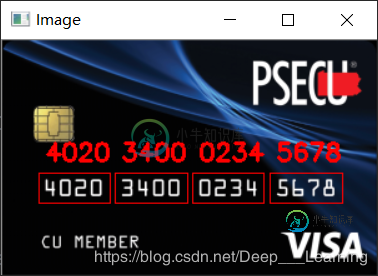Python开发之基于模板匹配的信用卡数字识别功能
环境介绍
Python 3.6 + OpenCV 3.4.1.15
原理介绍
首先,提取出模板中每一个数字的轮廓,再对信用卡图像进行处理,提取其中的数字部分,将该部分数字与模板进行匹配,即可得到结果。
模板展示

完整代码
# !/usr/bin/env python
# —*— coding: utf-8 —*—
# @Time: 2020/1/11 14:57
# @Author: Martin
# @File: utils.py
# @Software:PyCharm
import cv2
def sort_contours(cnts, method='left-to-right'):
reverse = False
i = 0
if method == 'right-to-left' or method == 'bottom-to-top':
reverse = True
if method == 'top-to-bottom' or method == 'bottom-to-top':
i = 1
boundingboxes = [cv2.boundingRect(c) for c in cnts]
(cnts, boundingboxes) = zip(*sorted(zip(cnts, boundingboxes), key=lambda b: b[1][i], reverse=reverse))
return cnts, boundingboxes
def resize(image, width=None, height=None, inter=cv2.INTER_AREA):
(h, w) = image.shape[:2]
if width is None and height is None:
return image
if width is None:
r = height / float(h)
dim = (int(w * r), height)
else:
r = width / float(w)
dim = (width, int(h * r))
resized = cv2.resize(image, dim, interpolation=inter)
return resized
# !/usr/bin/env python
# —*— coding: utf-8 —*—
# @Time: 2020/1/11 14:57
# @Author: Martin
# @File: template_match.py
# @Software:PyCharm
"""
基于模板匹配的信用卡数字识别
"""
import cv2
import utils
import numpy as np
# 指定信用卡类型
FIRST_NUMBER = {
'3' : 'American Express',
'4' : 'Visa',
'5' : 'MasterCard',
'6' : 'Discover Card'
}
# 绘图显示
def cv_show(name, image):
cv2.imshow(name, image)
cv2.waitKey(0)
cv2.destroyAllWindows()
# 读取模板图像
img = cv2.imread('./images/ocr_a_reference.png')
cv_show('img', img)
# 转化成灰度图
ref = cv2.cvtColor(img, cv2.COLOR_BGR2GRAY)
cv_show('ref', ref)
# 转化成二值图像
ref = cv2.threshold(ref, 10, 255, cv2.THRESH_BINARY_INV)[1]
cv_show('ref', ref)
# 计算轮廓
ref_, refCnts, hierarchy = cv2.findContours(ref.copy(), cv2.RETR_EXTERNAL, cv2.CHAIN_APPROX_SIMPLE)
cv2.drawContours(img, refCnts, -1, (0, 0, 255), 3)
cv_show('img', img)
print(np.array(refCnts).shape)
# 排序,从左到右,从上到下
refCnts = utils.sort_contours(refCnts, method='left-to-right')[0]
digits = {}
# 遍历每一个轮廓
for (i, c) in enumerate(refCnts):
(x, y , w, h) = cv2.boundingRect(c)
roi = ref[y:y+h, x:x+w]
roi = cv2.resize(roi, (57, 88))
digits[i] = roi
# 初始化卷积核
rectKernel = cv2.getStructuringElement(cv2.MORPH_RECT, (9, 3))
sqKernel = cv2.getStructuringElement(cv2.MORPH_RECT, (5, 5))
# 读取输入图像,预处理
img_path = input("Input the path and image name: ")
image_input = cv2.imread(img_path)
cv_show('image', image_input)
image_input = utils.resize(image_input, width=300)
gray = cv2.cvtColor(image_input, cv2.COLOR_BGR2GRAY)
cv_show('gray', gray)
# 礼帽操作,突出更明亮的区域
tophat = cv2.morphologyEx(gray, cv2.MORPH_TOPHAT, rectKernel)
cv_show('tophat', tophat)
gradX = cv2.Sobel(tophat, ddepth=cv2.CV_32F, dx=1, dy=0, ksize=-1)
gradX = np.absolute(gradX)
(minVal, maxVal) = (np.min(gradX), np.max(gradX))
gradX = (255 * ((gradX - minVal) / (maxVal - minVal)))
gradX = gradX.astype("uint8")
print(np.array(gradX).shape)
cv_show('gradX', gradX)
# 闭操作
gradX = cv2.morphologyEx(gradX, cv2.MORPH_CLOSE, rectKernel)
cv_show('gradX', gradX)
thresh = cv2.threshold(gradX, 0, 255, cv2.THRESH_BINARY | cv2.THRESH_OTSU)[1]
cv_show('thresh', thresh)
thresh = cv2.morphologyEx(thresh, cv2.MORPH_CLOSE, sqKernel)
cv_show('thresh', thresh)
# 计算轮廓
thresh_, threshCnts, hierarchy = cv2.findContours(thresh.copy(), cv2.RETR_EXTERNAL, cv2.CHAIN_APPROX_SIMPLE)
cnts = threshCnts
cur_img = image_input.copy()
cv2.drawContours(cur_img, cnts, -1, (0, 0, 255), 3)
cv_show('img', cur_img)
locs = []
# 遍历轮廓
for (i, c) in enumerate(cnts):
(x, y, w, h) = cv2.boundingRect(c)
ar = w / float(h)
if 2.5 < ar < 4.0 and (40 < w < 55) and (10 < h < 20):
locs.append((x, y, w, h))
# 将符合的轮廓从左到右排序
locs = sorted(locs, key=lambda ix: ix[0])
output = []
# 遍历每一个轮廓中的数字
for (i, (gX, gY, gW, gH)) in enumerate(locs):
groupOutput = []
group = gray[gY - 5:gY + gH + 5, gX - 5: gX + gW + 5]
cv_show('group', group)
# 预处理
group = cv2.threshold(group, 0, 255, cv2.THRESH_OTSU)[1]
cv_show('group', group)
# 计算每一组轮廓
group_, digitCnts, hierarchy = cv2.findContours(group.copy(), cv2.RETR_EXTERNAL, cv2.CHAIN_APPROX_SIMPLE)
digitCnts = utils.sort_contours(digitCnts, method='left-to-right')[0]
# 计算每一组的每个数值
for c in digitCnts:
(x, y, w, h) = cv2.boundingRect(c)
roi = group[y: y + h, x: x + w]
roi = cv2.resize(roi, (57, 88))
cv_show('roi', roi)
scores = []
for (digit, digitROI) in digits.items():
result = cv2.matchTemplate(roi, digitROI, cv2.TM_CCOEFF)
(_, score, _, _) = cv2.minMaxLoc(result)
scores.append(score)
# 得到最合适的数字
groupOutput.append(str(np.argmax(scores)))
cv2.rectangle(image_input, (gX - 5, gY - 5), (gX + gW + 5, gY + gH + 5), (0, 0, 255), 1)
cv2.putText(image_input, "".join(groupOutput), (gX, gY - 15), cv2.FONT_HERSHEY_SIMPLEX, 0.65, (0, 0, 255), 2)
# 得到结果
output.extend(groupOutput)
# 打印结果
print("Credit Card Type: {}".format(FIRST_NUMBER[output[0]]))
print("Credit Card #: {}".format("".join(output)))
cv2.imshow("Image", image_input)
cv2.waitKey(0)
cv2.destroyAllWindows()
结果展示

Credit Card Type: Visa Credit Card #: 4020340002345678
总结
以上所述是小编给大家介绍的Python开发之基于模板匹配的信用卡数字识别功能,希望对大家有所帮助,如果大家有任何疑问请给我留言,小编会及时回复大家的。在此也非常感谢大家对小牛知识库网站的支持!
如果你觉得本文对你有帮助,欢迎转载,烦请注明出处,谢谢!
-
我的函数每次我调用它抱怨非穷尽模式时都会抛出一个异常 并行检查的定义如下: 在应用了-Wall的GHCI中运行函数只会返回 我对哈斯克尔相当陌生,也相当困惑。我认为模式匹配与和应该解决这个问题。
-
本文向大家介绍python tensorflow基于cnn实现手写数字识别,包括了python tensorflow基于cnn实现手写数字识别的使用技巧和注意事项,需要的朋友参考一下 一份基于cnn的手写数字自识别的代码,供大家参考,具体内容如下 做了2000次迭代,在测试集上的识别精度能够到0.9772…… 以上就是本文的全部内容,希望对大家的学习有所帮助,也希望大家多多支持呐喊教程。
-
本文向大家介绍基于python实现微信模板消息,包括了基于python实现微信模板消息的使用技巧和注意事项,需要的朋友参考一下 我的风格,废话不多说了,直接给大家贴代码了,并在一些难点上给大家附了注释,具体代码如下所示: 好了,代码到此结束了,希望以上所述关于python模板消息的相关叙述能够给大家带来帮助。哪里写的不好,还请各位大侠多多见谅,提出宝贵意见,谢谢。
-
本文向大家介绍python识别文字(基于tesseract)代码实例,包括了python识别文字(基于tesseract)代码实例的使用技巧和注意事项,需要的朋友参考一下 这篇文章主要介绍了python识别文字(基于tesseract)代码实例,文中通过示例代码介绍的非常详细,对大家的学习或者工作具有一定的参考学习价值,需要的朋友可以参考下 Ubuntu版本: 1.tesseract-ocr安装
-
Im使用java中的OpenCV,使用eclipse开发,图像以这种方式读取以进行模板匹配。 这很好,但我的图像不在本地计算机中。我应该比较mysql数据库中服务器上的2000个图像。把2000张图片保存到我的电脑上,然后读取它们是没有意义的。 所以我需要的是那个高鬼。imread(infle)读取图像:Highgui。imread(图像中的图像)或Highgui。imread(文件填充),我找不
-
本文向大家介绍iOS开发之手势识别,包括了iOS开发之手势识别的使用技巧和注意事项,需要的朋友参考一下 一、UIGestureRecognizer简单介绍 我们已经学习了触摸事件处理,但触摸事件处理起来很麻烦,每个触摸事件处理都需要实现3个touches方法,比较繁琐,实际上我们可以使用更加简单的触摸事件处理操作,那就是 手势识别UIGestureRecognizer 。 手势识别操作基类UIGe

